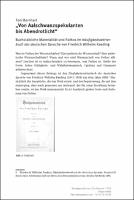Chapter „Von Aalschwanzspekulanten bis Abendrotlicht“
Buchstäbliche Materialität und Pathos im Häufigkeitswörterbuch der deutschen Sprache von Friedrich Wilhelm Kaeding
| dc.contributor.author | Bernhart, Toni | |
| dc.contributor.editor | Klausnitzer, Ralf | |
| dc.contributor.editor | Spoerhase, Carlos | |
| dc.contributor.editor | Werle, Dirk | |
| dc.date.accessioned | 2019-11-19 23:55 | |
| dc.date.accessioned | 2020-01-07 16:47:06 | |
| dc.date.accessioned | 2020-04-01T09:26:17Z | |
| dc.date.available | 2020-04-01T09:26:17Z | |
| dc.date.issued | 2015 | |
| dc.identifier | 1006448 | |
| dc.identifier | OCN: 1135851253 | en_US |
| dc.identifier.uri | http://library.oapen.org/handle/20.500.12657/23696 | |
| dc.description.abstract | This book examines the ways that texts from the humanities have fostered particular approaches to knowledge by constructing different versions of a ‘scientific ethos’. The studies contained in this volume reveal how and why different forms of scientific ethos have developed since the mid-18th century. The studies also illuminate associated styles of rhetorical argumentation. | |
| dc.language | German | |
| dc.subject.classification | thema EDItEUR::D Biography, Literature and Literary studies::DS Literature: history and criticism::DSA Literary theory | en_US |
| dc.subject.classification | thema EDItEUR::D Biography, Literature and Literary studies::DS Literature: history and criticism::DSB Literary studies: general | en_US |
| dc.subject.other | Epistemology | |
| dc.subject.other | Ethos of scholarship | |
| dc.title | Chapter „Von Aalschwanzspekulanten bis Abendrotlicht“ | |
| dc.title.alternative | Buchstäbliche Materialität und Pathos im Häufigkeitswörterbuch der deutschen Sprache von Friedrich Wilhelm Kaeding | |
| dc.type | chapter | |
| oapen.identifier.doi | 10.1515/9783110375008-009 | |
| oapen.relation.isPublishedBy | 2b386f62-fc18-4108-bcf1-ade3ed4cf2f3 | |
| oapen.relation.isPartOfBook | 76d80948-4483-414c-b843-4c161c3a7aea | |
| oapen.relation.isFundedBy | 7292b17b-f01a-4016-94d3-d7fb5ef9fb79 | |
| oapen.relation.isbn | 9783110374995; 9783110386257 | |
| oapen.collection | European Research Council (ERC) | |
| oapen.place.publication | Berlin/Boston | |
| oapen.grant.number | 246603 | |
| oapen.grant.acronym | DRAMANET | |
| oapen.identifier.ocn | 1135851253 |

